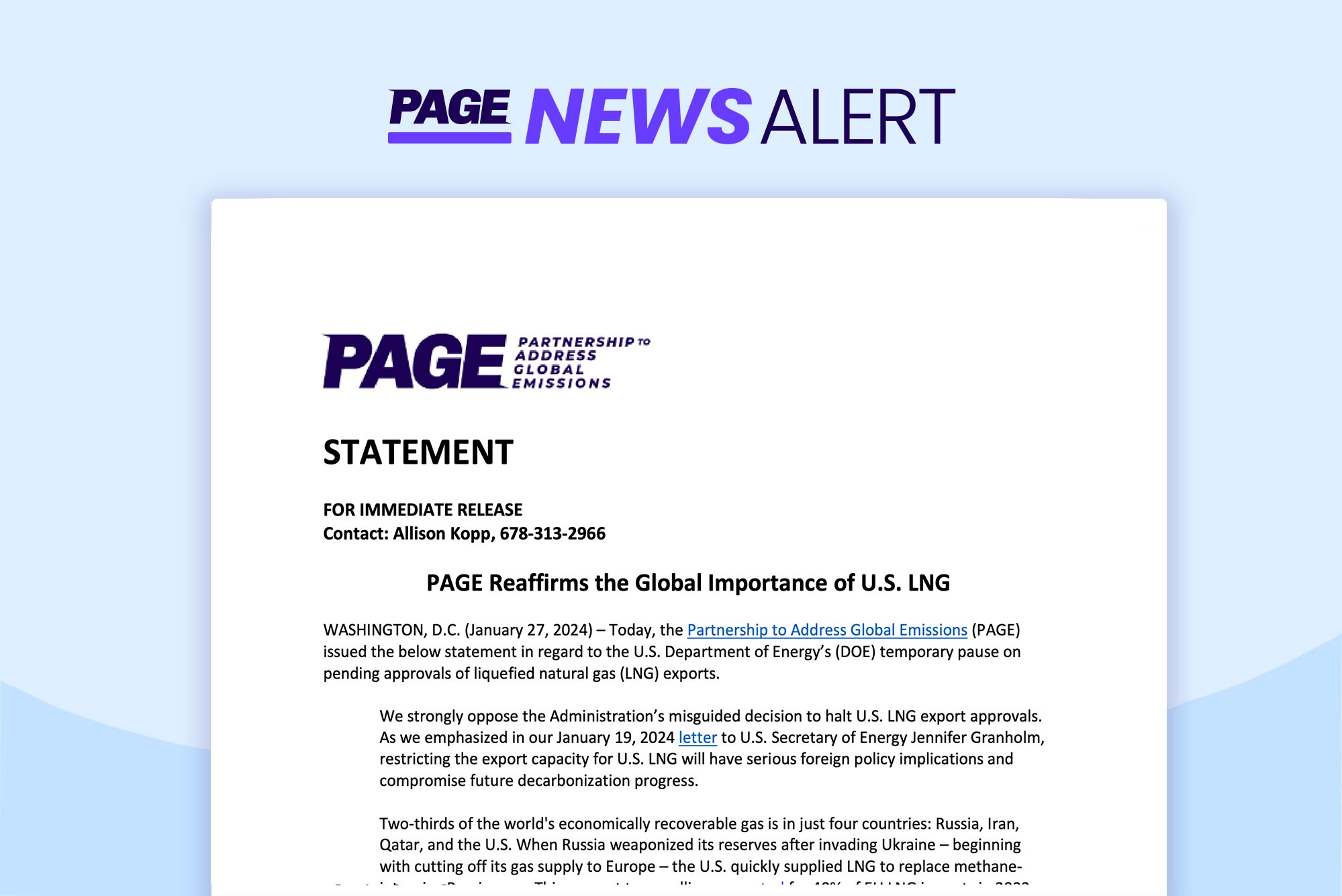FOR IMMEDIATE RELEASE
Contact: Allison Kopp, 678-313-2966
WASHINGTON, D.C. (January 27, 2024) – Today, the Partnership to Address Global Emissions (PAGE) issued the below statement in regard to the U.S. Department of Energy’s (DOE) temporary pause on pending approvals of liquefied natural gas (LNG) exports.
We strongly oppose the Administration’s misguided decision to halt U.S. LNG export approvals. As we emphasized in our January 19, 2024 letter to U.S. Secretary of Energy Jennifer Granholm, restricting the export capacity for U.S. LNG will have serious foreign policy implications and compromise future decarbonization progress.
Two-thirds of the world's economically recoverable gas is in just four countries: Russia, Iran, Qatar, and the U.S. When Russia weaponized its reserves after invading Ukraine – beginning with cutting off its gas supply to Europe – the U.S. quickly supplied LNG to replace methane-intensive Russian gas. This support to our allies accounted for 40% of EU LNG imports in 2022. The new U.S. LNG export pause has the potential to create massive global energy instability once again, as first instigated by President Putin.
If we restrict our gas exports, we'll leave allies vulnerable to authoritarian regimes, dirtier forms of energy, such as coal, and energy instability. The very fact that the DOE’s pause of applications includes a national security exception proves how vital this energy source is to our allies in maintaining global security.
Members of PAGE share the DOE’s goal of ensuring affordable and stable energy prices for Americans. However, chilling export development could have a detrimental effect on the much-needed buildout of infrastructure to ensure Americans’ reliable access to energy. And the conjecture that LNG exports drive up U.S. energy prices is inaccurate. According to the Center for Strategic and International Affairs (CSIS) over the past five years, the increase in U.S. LNG exports did not have any effect on energy prices at home.
The U.S. should expand LNG exports to replace foreign coal. In 2021, coal accounted for 44% of emissions from fuel combustion while only comprising 27% of the total energy supply. Meanwhile, gas' share (22%) was lower than its supply (24%). The IEA also reports that coal and oil production are responsible for more methane than gas, with Chinese coal production alone emitting 15% of the world's energy-sector methane. This dwarfs LNG liquefaction and shipping methane emissions, which comprise just 0.3%.
Energy security, cost, and climate action are all critical factors for a global energy transition. Guided by stringent regulatory standards and produced and transported by responsible companies, U.S. gas is the only solution that accomplishes this goal. The Biden Administration should not weaponize U.S. energy policy to win an election; this is dangerous for our allies abroad and for global efforts to combat climate change.
PAGE will continue to closely monitor and engage with the administration to ensure this pause is not only temporary but also short lived, so it doesn’t permanently affect our national security.
About PAGE
The Partnership to Address Global Emissions (PAGE) is a coalition of responsible energy companies, allied NGOs, labor unions and leading climate advocates dedicated to reducing global emissions by promoting U.S. policies that protect the climate, strengthen the economy, lower energy costs and bolster energy security through the production and export of cleaner natural gas. Learn more at https://www.pagecoalition.com/.

